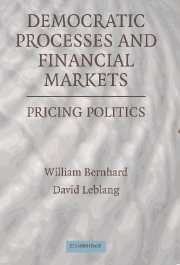Book contents
- Frontmatter
- Contents
- Acknowledgments
- 1 Introduction
- 2 Democratic Processes and Political Risk: Evidence from Foreign Exchange Markets
- 3 When Markets Party: Stocks, Bonds, and Cabinet Formations
- 4 The Cross-National Financial Consequences of Political Predictability
- 5 Cabinet Dissolutions and Interest Rate Behavior
- 6 Bargaining and Bonds: The Process of Coalition Formation and the Market for Government Debt in Austria and New Zealand
- 7 Time, Shares, and Florida: The 2000 Presidential Election and Stock Market Volatility
- 8 Polls and Pounds: Exchange Rate Behavior and Public Opinion in Britain
- 9 Conclusion: Political Predictability and Financial Market Behavior
- References
- Index
9 - Conclusion: Political Predictability and Financial Market Behavior
Published online by Cambridge University Press: 02 December 2009
- Frontmatter
- Contents
- Acknowledgments
- 1 Introduction
- 2 Democratic Processes and Political Risk: Evidence from Foreign Exchange Markets
- 3 When Markets Party: Stocks, Bonds, and Cabinet Formations
- 4 The Cross-National Financial Consequences of Political Predictability
- 5 Cabinet Dissolutions and Interest Rate Behavior
- 6 Bargaining and Bonds: The Process of Coalition Formation and the Market for Government Debt in Austria and New Zealand
- 7 Time, Shares, and Florida: The 2000 Presidential Election and Stock Market Volatility
- 8 Polls and Pounds: Exchange Rate Behavior and Public Opinion in Britain
- 9 Conclusion: Political Predictability and Financial Market Behavior
- References
- Index
Summary
The predictability of political outcomes conditions how markets respond to political events. Where democratic political events have less predictable outcomes, market returns are depressed and volatility increases. In contrast, where market actors can easily forecast the political outcome, returns do not exhibit any unusual behavior. Across currency, stock, and, to a lesser degree, bonds, we demonstrated empirical support for this proposition using a variety of techniques in a number of markets (spot, forward, and futures). The predictability of outcomes can help explain the variation of market responses to political events.
Further, prior beliefs about an eventual outcome condition how political developments affect market behavior. Where new information confirms expectations, market actors do not adjust their portfolios. But when news causes market actors to update their beliefs, markets actors do reallocate their portfolios, and overall market behavior changes. By investigating information arrival in separate political events, we find empirical support for this argument as well.
In some sense, these conclusions are not controversial. Indeed, anecdotal evidence from the financial news media confirms these arguments almost everyday: Markets are “cautious” in the run-up to a particular election. The “market” is taking a “wait-and-see attitude” towards the new government. Market actors “widely anticipated the cabinet dissolution” and did not move in response to the “expected announcement.”
Prior academic investigations, however, have been less successful in finding systematic evidence that markets respond to politics in this manner.
- Type
- Chapter
- Information
- Democratic Processes and Financial MarketsPricing Politics, pp. 225 - 236Publisher: Cambridge University PressPrint publication year: 2006



